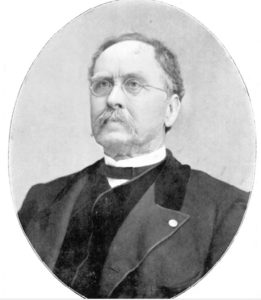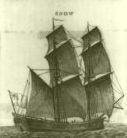Today’s blog post is the twelfth in a series, the transcription of Nimrod Headington’s 1852 journal, Trip to California.
In his journal Nimrod Headington details his voyage from New York to San Francisco, where he would stake his claim and pan for gold. [1] [2]
Their ship, the Race Hound, set sail from New York on 16 February 1852 and rounded Cape Horn during the night of 4 May. Today’s installment begins on 23 June 1852, the day after the longest day of the year, when they crossed the Equator. They continued sailing northward.
Nimrod writes about the conditions on the ship:
June 23rd. Breeze from the south very light but so steady that it took us on our course. The day was clear and very hot. I went up on masthead and sat and read all day. In the evening the sailors gathered on poop deck and had a dance, and they all got drunk, and they carried on all night so that we got no sleep for their noise. The mate being sick was all of our dependence. This captain was afraid of those wicked wretches, and they were wanting a chance to kill him as they had a grudge against him for some of his cruel treatment of them. Some time before when they were all sober—and if they had have tackled him, there would not have been much mercy shown him from the passengers, for he had treated us all badly by not giving us enough to eat or to drink. We were promised when we left New York that we should all fare alike in first and second cabin—that our provision should be the same. But before we were out a week, there was a material difference in the grub, which kept up a row all the time. Before we were out 20 days, we were passed our allowance of water, which was only one quart for each man a day; however, as small as this quantity appears, I never suffered for water at any time during the voyage. As we did not have much exercise, but little water was required. But worst of all, the water got so bad before we could reach a port to get fresh water again. The water smelled so bad that we would do without just as long as we could, for the smell was enough to set one to vomiting. We kept haunting the captain until we got fresh bread baked every morning instead of hard tack, which was so hard that no man could eat it without grinding first.
June 24th. This morning had every appearance of a good day for us. The wind was strong and fair, and we were making fine headway when all of a sudden about 10 o’clock black clouds came up from the northeast and soon overshadowed us. And in a few minutes, the rain fell in torrents for about 2 hours, when it ceased and a favorable breeze struck up again. Before this, I had been sleeping on a deck for about a week. But when this rain came, we all had to go below, where we suffered for want of air. But the showers being short, we were soon on deck again. It was too cloudy to get the sun’s altitude. We could not tell what latitude or longitude we were in.
June 25th. The morning appeared very pleasant, but we had several showers of rain during the day. All being well, we were all merry, and some of them got a little too merry. Six or eight of our men got on a spree and showed off a little. They made so much noise that the captain came on deck and ordered them to go forward, but they drove the captain to his quarters in a quick time. And when they had as much fun as they wanted, they got quiet and went to bed.
That night we came in sight of the North Star—which was the first time we had seen it since leaving north latitude on the Atlantic 87 days before! When I saw it, I resolved that I would never go out of sight of it again. The sun and moon began to rise and set in their proper places again, and things began to appear natural again. We had never been used to looking north for the sun before. Neither had we used to having two summers and two winters in the same year. But we have seen them this year. We have felt the burning heat of the sun a second time at the equator and felt the sleet and snow a second time. Leaving New York in the winter, we encountered another winter on rounding the cape, and a severe winter more so than on land on account of the velocity of the wind. A voyage on the high sea is the place to try the courage of men and to learn their disposition. Some men during storms would go below and crawl into bed and cover up head and heels to keep from witnessing the awfulness of a storm at sea. Some would pray with all their might. Some would not leave the deck while the storm lasted. For my part, I was always among the latter and could never sleep during a storm no matter how long it lasted. I always watched the old hands. As long as I could not see that they were alarmed, I felt that we would come out all right.
Now we have been 20 days without the least appearance of a storm or a calm, which is very pleasant after coming around the cape through so many storms and gales of wind and the dangers of going ashore or on some hidden rock or island—all of which the sea is full of around the end of the cape. We are now in latitude 5°40’, longitude 100°11’ west, thermometer 85°.
June 26th. We had a ten knot breeze last night and this morning until 4 o’clock, when it began to rain. The wind full, and it is almost calm until 12 o’clock, when a light breeze set in from the northwest. We were then in latitude 7°18’, longitude 111° west. [3]
To be continued…
I will post Nimrod’s journal in increments, but not necessarily every week.
[1] Nimrod Headington at the age of 24, set sail from New York in February 1852, bound for San Francisco, California, to join the gold rush and to hopefully make his fortune. The Panama Canal had not been built at that time and he sailed around the tip of South America to reach the California coast. Nimrod Headington kept a diary of his 1852 journey and in 1905 he made a hand-written copy for his daughter Thetis O. Tate. This hand-written copy was eventually passed down to Nimrod’s great-great-granddaughter, Karen (Liffring) Hill (1955-2010). Karen was a book editor and during the last two years of her life she transcribed Nimrod’s journal. Nimrod’s journal, Trip to California, documents his travels between February of 1852 and spring of 1853.
[2] Nimrod Headington (1827-1913) was the son of Nicholas (1790-1856) and Ruth (Phillips) (1794-1865) Headington. He was born in Mt. Vernon, Knox County, Ohio, on 5 August 1827 and married Mary Ann McDonald (1829-1855) in Delaware County, Ohio, in 1849. Nimrod moved to Portland, Jay County, Indiana, by 1860 and during the Civil War served in the 34th Indiana Infantry as a Colonel, Lieutenant Colonel, and Major. Nimrod died 7 January 1913 and is buried in Green Park Cemetery, Portland. Nimrod Headington is my fourth great-granduncle, the brother of my fourth great-grandfather, William Headington (1815-1879).
[3] Nimrod Headington’s journal, transcription and photos courtesy of Ross Hill, 2019, used with permission.





2 comments
Nimrod Headington was quite the adventurer. I am really enjoying this series and look forward to each installment. I will be sorry to see his trip come to an end. Thanks for sharing.
Author
You are welcome! I am happy to be able share his lengthy account of his trip and glad to hear that you are enjoying it. Thanks for writing!